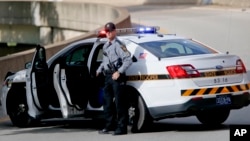Pennsylvania state police will soon be required to report more fully the circumstances under which they notify Immigration and Customs Enforcement (ICE) agents when they stop undocumented immigrants for traffic violations.
The move comes amid mounting criticism by immigration lawyers and activists that state troopers have been overzealous in assisting with ICE's stepped-up enforcement ordered by the Trump administration. It's also part of a wider debate in several U.S. states about whether police and other state agencies should cooperate with ICE in the wake of the crackdown against illegal immigration over the past year and a half.
In Pennsylvania, a recent investigation by ProPublica and The Philadelphia Inquirer uncovered cases in which state and local police helped ICE round up undocumented immigrants, especially Hispanics, using questionable traffic stops.
According to the ProPublica/Inquirer investigation, there were more "at-large" arrests of undocumented immigrants without criminal convictions by ICE's Philadelphia field office, which includes Pennsylvania, Delaware and West Virginia, than anywhere else in the country. Some 1,740 people without criminal records were arrested in the year after President Donald Trump took office, according to the investigation, many with the help of state and local police. This high arrest rate of non-criminals has raised accusations of racial profiling.
Assertion dismissed
Pennsylvania state police spokesman Ryan Tarkowski dismissed the accusation, saying: "The state police does not tolerate any type of bias-based policing." He added that all complaints were independently investigated.
As for the additional reporting guidelines for state police officers, Tarkowski described the measure as improving the agency's record management system.
"What we're doing with any outside [law enforcement] agency ... is we're asking police officers to write a complete narrative of the circumstances in which the outside agency was notified, whether it was an expired inspection sticker, traffic violation, et cetera," Tarkowski told VOA. "It's an effort to have as much information as possible in our reports."
Tarkowski denied the change in reporting requirements was made in response to publicity about ICE's increased enforcement in Pennsylvania. "There's been no change in policy in making stops for traffic or other violations," he said.
However, Pennsylvania Governor Tom Wolf, a Democrat who is running for re-election this year, said in a recent statement that there was a need for "stronger uniform procedures addressing state police requests of assistance from outside agencies, including ICE, especially given the new pressure on state and local agencies from the federal government."
Immigration lawyer Craig Shagin believes the measure "might be helpful as a check" to what he said had been a consistent pattern of questionable traffic stops during which Hispanic drivers and passengers were interrogated about their legal statuses.
"Asking for the driver's licenses of the passengers is not legal," Shagin told VOA. "Their stops have been frivolous — a chip on a brake light, a tinted window. If it's for a DUI (driving under the influence of alcohol), that's one thing, and you might want to put that person in removal proceedings. It's another to stop a car for a tinted window."
Other states
The additional reporting requirements for Pennsylvania's state troopers come as some other states, including New York and California, have imposed limits on police questioning of immigrants about their legal status or holding them for ICE without a warrant. A California law, for example, which took effect this year, strictly limits state and local agencies' sharing of information with federal officers about an arrest unless the person has been convicted of serious crimes.
On the other hand, ICE has partnerships with 78 local law enforcement agencies in 20 states to train police officers so they can carry out immigration law enforcement actions within their jurisdictions. Pennsylvania is not among those states.
Citing the experience of his clients seeking help from his Harrisburg, Pennsylvania, law office, Shagin observed they were more likely to have been stopped by state police officers instead of local police.
"Community police tend not to do that. They understand the community depends on its immigrant residents for tips about possible criminal activity and that immigrants fill needed jobs," he said.
The expanded reporting requirements for state police are expected to go into effect later this summer, spokesman Tarkowski said.





